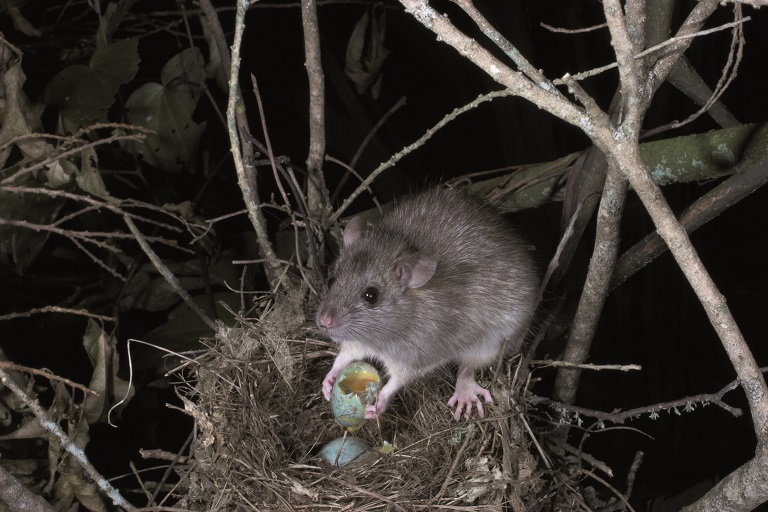| Objective |
| Provide advice and information on rat control. |
There are two introduced European rat species in New Zealand; the Norwegian rat (Rattus novegicus) and the ship rat (Rattus rattus).
Rats are a threat to breeding birds as they prey on eggs and chicks. Ship rats are a particular problem as they are very agile and exceptional tree climbers. They can easily reach tree canopies, spending most of their times there hunting for nests to prey on. Our native birds did not evolve with rats and have no defences against them. Many native bird species also breed very slowly and cannot keep up with the present rate of predation.
The Department of Conservation carries out rat control in high value sites to protect endangered native species, such as kōkako and blue duck. The aim of this control is to keep rat numbers low enough to allow eggs to hatch and young birds to fledge. In areas where rat control occurs, there is often observed recovery of a range of native species like insect, snail, lizard and frog species, in addition to increases in the number of regenerating native plant seedlings (e.g. miro and hīnau). This illustrates the wide-ranging effects rats can have on biodiversity in natural areas.
Rats are widespread throughout the Waikato region.
 Ship rat
Ship rat
What do they look like?
Norway rat
- Short body and heavy tail, with the tail being slightly shorter than the combined length of the head and body.
- Fur on back is brown, with white-tipped grey fur on belly.
- Largest rat species in New Zealand, usually weigh 150g-300g but can grow to more than 500g.
- Can grow to over a half a meter in length snout to tail.
Ship rat
- The tail is longer than the combined length of the head and body.
- Pointed muzzle with large ears.
- Fur on back is brown or black, with grey, white, or creamy-white fur on belly.
- Normally weigh 130g-170g (up to 215g).
Controlling rats
There are a range of control tools available for rats, including trapping and poisoning.
Predator Free New Zealand and Bionet have best practice advice on their websites for landowners and community groups on how to undertake rat control.
You can also speak to one of our animal pest staff for advice and information on controlling rats on freephone 0800 800 401.





To ask for help or report a problem, contact us
Tell us how we can improve the information on this page. (optional)